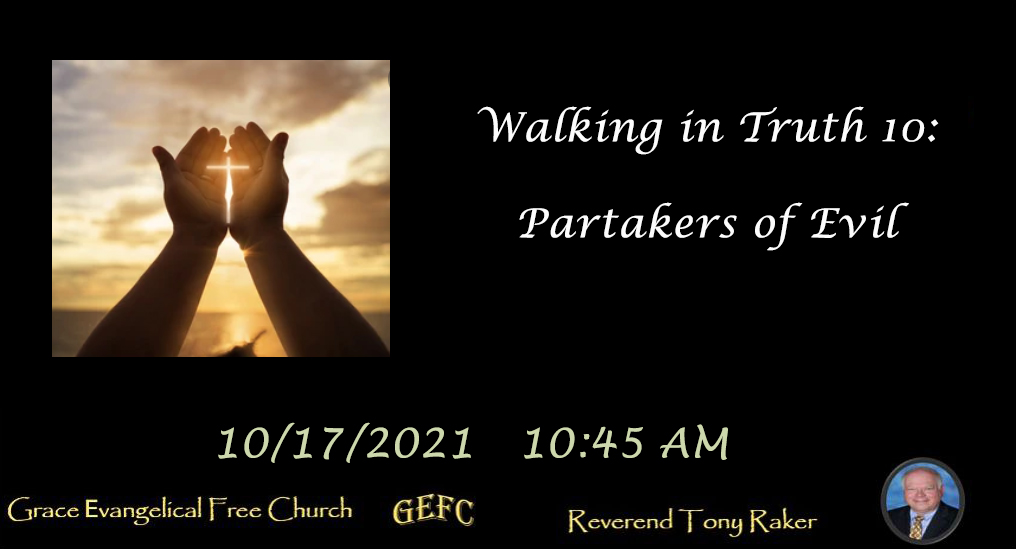All Sermons


The Apostle John addresses believers in Christ to avoid, wittingly and unwittingly, from partaking in evil.
2 John 1:11: “for whoever greets him takes part in his wicked works.”
- Grammatical Usage: “takes part” or in the Greek, “koinóneó” meaning, “to come into communion or fellowship, to become a sharer, be made a partner”; “wicked” or “ponéros” meaning, “evil; hurtful in influence”.
- Literal Interpretation: “…for the one who greets him shares in his evil works.”
- Contextual/Comparison: God keeps His Word: God continually uses His Word. An example of Christians wittingly or unwittingly propagating a hurtful influence is the alignment with CRT: Critical Race Theory:
- What is CRT?
-
- Critical race theory is an approach to social change, developed from the broader critical theory which developed out of Marxism
- CRT approaches issues such as justice, discrimination and inequality with a specific intent of reshaping society
- Critical race theory is grounded in several key assumptions:
- American government, law, culture, and society are inherently and inescapably discriminatory
- Everyone, even those without discriminatory views, perpetuates such by supporting those structures
- The personal perception of the oppressed—their “narrative”—outweighs the actions or intents of others
- Oppressed groups will never overcome disadvantages until the discriminatory structures are replaced
- Oppressor ethnics or class groups never change out of altruism; they only change for self-benefit
- Application of laws and fundamental rights should be different based on the ethnicity or class group of the individual(s) involved
In short, critical race theory presupposes that everything about American society is thoroughly racist, and minority groups will never be equal until American society is entirely reformed.
- Anti-Christ approach to CRT
-
- Some have attempted to apply critical race theory principles to Christianity
- Suggest that the Christian church must adopt the critical race theory approach to society, or else it is not really preaching the gospel
- “Whiteness” defined in a unique sense, is a type of sin and incompatible with salvation
- Those in certain ethnic/social economic groups must “repent” of such status, above and beyond other sins, in order to be truly Christian
- Christianity ought to follow a progressive theology, especially with respect to gender and sexuality
- Biblical approach to CRT
-
- So far as it applies to faith, Christianity, or spirituality, there is no truth whatsoever to critical race theory
- Critical race theory entirely violates a biblical worldview, however, by suggesting that people are essentially defined by their race or class, rather than by their individual acts and attitudes (Psalm 28:4)
- Critical race theory incorrectly emphasizes intersectional categories such as gender, ethnicity, sexual preference, and economic status above and beyond a person’s own choices and responsibilities (Psalm 62:12)
- Critical race theory also conflicts with a biblical approach to objective, absolute truth. In no small part, this includes suggesting that an “oppressed” person’s feelings matter more than what the “oppressor” has actually done or intended (Romans 14:10–12)
- As applied to spiritual matters, critical race theory effectively replaces an individual, personal relationship with God with a tribalistic, ethnocentric, collectivistic system
- It also greatly overemphasizes material and social concepts to the detriment—or even the exclusion—of the true gospel (Luke 12:15)
- So far as it applies to faith, Christianity, or spirituality, there is no truth whatsoever to critical race theory
- Biblical approach to prejudice
-
- When and where prejudices are found in the church, they should be addressed according to sound doctrine, not according to an inherently unbiblical approach such as critical race theory
- Prejudice has no place in the heart of a believer in Christ. Our lives are to be ruled by humility, obedience, and love for God and others (Romans 13:7–9) – prejudice violates all three Biblical stipulations
- To be prejudiced means we consider ourselves better than someone else, which is pride (Philippians 2:3)
- It means we are directly disobeying Jesus’ command to treat others as we would want to be treated (Matthew 7:12)
- And it means that we are not fully loving God, since we are unwilling to love people created in His image (1 John 4:20–21)
- Due to our fallen human natures, we all struggle with some form of prejudice; we should be quick to recognize it as sin and ask the Lord to rid us of it. When we are willing to see our prejudice as God sees it, we can repent of it and seek His help in changing our perception (1 John 1:9)
- When and where prejudices are found in the church, they should be addressed according to sound doctrine, not according to an inherently unbiblical approach such as critical race theory
- Conclusion: Only God’s way is truly corrective. So, are you aligned with Him?
